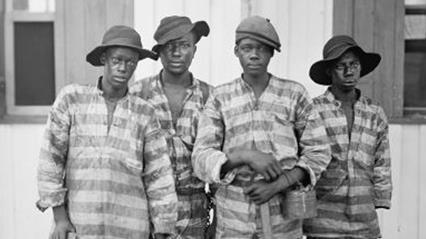Documentary exposes how slavery continued long after the Civil War. Coming to PBS this month.
Last edited Tue Jan 31, 2012, 09:56 AM - Edit history (1)
 http://www.screendaily.com/reviews/the-latest/slavery-by-another-name/5037213.article
http://www.screendaily.com/reviews/the-latest/slavery-by-another-name/5037213.article
Slavery didn’t end with the Emancipation Proclamation. The name just changed, and for many American Blacks, things got worse before they got better under freedom. Slavery By Another Name, based on a prize-winning book by the journalist Douglas A. Blackmon, is a compendium of abuses that augments that conventionally-accepted historical record of the economy of the American South after the Civil War.
-snip-
Slavery By Another Name reveals a dirty secret that has long been known in the historical community. Much of the South was built on forced Black labor after slavery was declared unconstitutional in 1863 and the South surrendered to end the Civil War in 1865. Blacks who were convicted of crimes, no matter how insignificant — vagrancy or the theft of a pig worth more than $1 – were often given long sentences and made available to mines, farms and factories.
Change was slow and begrudging. “If you had something for free in the past, you don’t necessarily want to pay for it now,” says one historian. The practice was brutal. About a third of prisoner mine workers in Alabama coal mines died every year.
Sam Pollard (with the help of a team of historians) shows how the South’s steel industry in Birmingham Alabama was built on prison labor, as were the coal and iron mines that supplied those mills. Some of those businesses were taken over by United States Steel, the nation’s largest firm at the time, which meant that Southerners were not the only beneficiaries. Imagine D. W. Griffith’s Birth Of A Nation, with corporate managers allied with the Ku Klux Klan.
